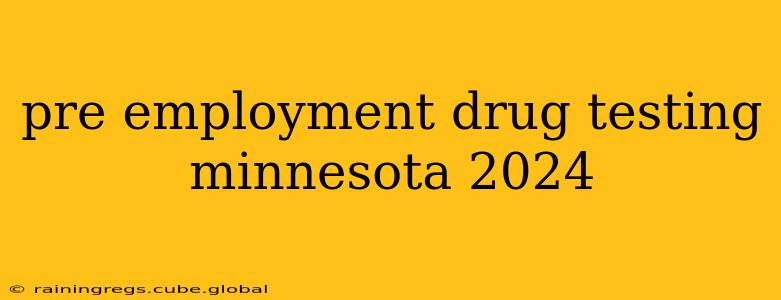Pre-employment drug testing in Minnesota is a complex issue, governed by a blend of state and federal laws, as well as company policies. This guide provides a comprehensive overview of the current landscape in 2024, helping both employers and potential employees understand their rights and responsibilities.
What is the Legal Status of Pre-Employment Drug Testing in Minnesota?
Minnesota doesn't have a statewide law specifically prohibiting pre-employment drug testing. This means employers generally have the right to conduct these tests, but there are important limitations and considerations. The legality hinges on factors like the nature of the job, the testing methods used, and adherence to employee privacy rights. While there's no blanket ban, certain aspects of drug testing are regulated by federal and state laws concerning discrimination and privacy.
What Drugs are Typically Tested For in Minnesota Pre-Employment Screens?
The most common drugs screened for in pre-employment drug tests in Minnesota include:
- Marijuana (THC): This is a significant point of contention, especially given the changing legal landscape around recreational and medicinal marijuana. While legal for recreational or medical use in Minnesota, employers may still prohibit its use by their employees. Testing positive for THC can still lead to disqualification, even if the candidate holds a valid medical marijuana card.
- Cocaine: This highly addictive substance is frequently included in pre-employment drug tests.
- Amphetamines: This category encompasses both prescription and illicit stimulants.
- Opiates: This includes substances like heroin, morphine, and codeine.
- Phencyclidine (PCP): A powerful hallucinogen rarely used legally.
The specific panel of drugs tested for may vary depending on the employer and the nature of the job. High-risk positions often involve more extensive testing.
Can an Employer in Minnesota Refuse to Hire Someone Because of a Positive Drug Test?
Generally, yes. Employers have the right to set standards for employment, and a drug-free workplace is a common policy. However, the employer must follow specific procedures to avoid discrimination claims. They can’t use drug testing as a pretext to discriminate based on protected characteristics under federal and state law. For example, refusing to hire someone based on a positive THC test might be challenged if the employer doesn't have a consistent policy applied equally to all candidates, regardless of race, religion, etc.
What are My Rights as an Applicant Regarding Pre-Employment Drug Testing in Minnesota?
As a job applicant in Minnesota, you have the right to:
- Privacy: Your drug test results should be kept confidential.
- Due process: If your test results are positive, you typically have the right to appeal or challenge the results, often by requesting a retest.
- Protection from discrimination: The employer cannot discriminate based on your race, gender, religion, disability, or other protected characteristics.
Is it Legal for Minnesota Employers to Conduct Hair Follicle Drug Tests for Pre-Employment Screening?
While hair follicle drug testing is permitted, it's crucial that the employer follows all applicable laws and regulations regarding privacy and informed consent. Hair follicle tests can detect drug use over a longer period than urine tests, leading to potential legal challenges if not handled appropriately. Transparency with the applicant regarding the testing method is key.
Can a Minnesota Employer Require a Pre-Employment Physical Exam Including Drug Testing?
Yes, a Minnesota employer can request a pre-employment physical, which might include drug screening. However, this must be job-related and consistent with business necessity. The employer can't conduct tests that are overly intrusive or unrelated to job performance. Any information obtained must be kept confidential and used only for legitimate employment purposes.
What are the Penalties for Falsifying Information on a Pre-Employment Drug Test?
Providing false information during a pre-employment drug test can have significant consequences. It could range from disqualification from the job application process to legal ramifications, depending on the severity of the falsification. Employers take this seriously and may report such actions to authorities.
This information is for general guidance only and does not constitute legal advice. Consult with an attorney or HR professional for specific legal advice regarding pre-employment drug testing in Minnesota. The laws and interpretations can change, so staying up-to-date is crucial.
